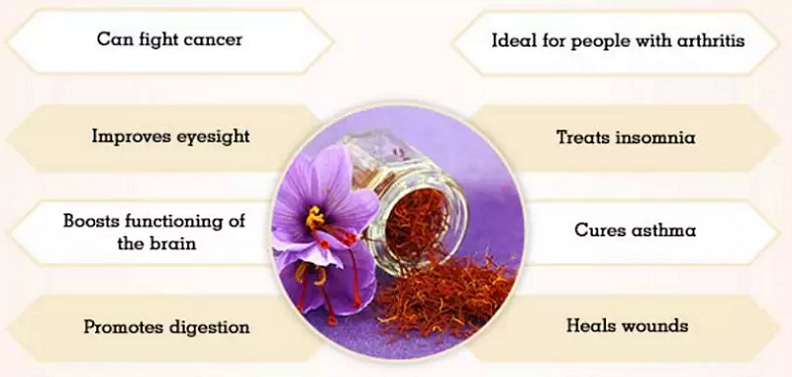
Saffron is a golden-hued treasure that is more than just a culinary delight; it’s a powerful health supplement that has been used traditionally for centuries. Lately, it’s been garnering significant attention in the world of ophthalmology, as saffron extract shows promising potential for eye health and vision support.
Contents
Introduction to Saffron Extract
Before taking on the specific advantages and mechanisms of saffron for our eyes, it’s crucial to have a comprehensive understanding of what saffron is and why it has been held in such high regard throughout history.
Definition of Saffron Extract
Saffron extract refers to a concentrated form of saffron, a spice derived from the flower of Crocus sativus, also known as the “saffron crocus”. The crimson stigmas and styles, called threads, are collected and dried to be used mainly as a seasoning and coloring agent in food.
Known for its distinct aroma, vibrant color, and unique flavor, saffron is the world’s most expensive spice by weight. But beyond these culinary properties, saffron is also gaining increasing recognition for its health benefits, particularly for its potential in promoting eye health.
Historical Background of Saffron Use
Saffron’s history as both a culinary ingredient and a medicinal plant can be traced back over 3,000 years. Originating from the Middle East, it was widely used by ancient civilizations in Egypt, Persia, and Greece. It’s been known to be used for a wide range of purposes, including as a fabric dye, a perfume, a mood enhancer, and a potent medicine for numerous ailments.
Hippocrates, often recognized as the father of medicine, used saffron in his practice for its therapeutic properties. In traditional Chinese and Ayurvedic medicine, saffron was prescribed to alleviate digestive issues, improve mood, and even as an aphrodisiac. But one of its most interesting applications, and the focus of this post, is its traditional use in supporting eye and vision health. This historic usage sets a promising premise for the current scientific exploration of saffron extract’s potential for supporting eye health.

Overview of Eye Health and Vision Support
Our eyes are among the most crucial sensory organs that we possess, as they enable us to interpret the world around us through sight. To truly understand the value of saffron extract in promoting eye health and vision support, it’s essential to appreciate the complexity of our eyes and the importance of taking active steps to protect and enhance our vision.
Importance of Maintaining Eye Health
Maintaining good eye health is essential not only to prevent vision loss and eye disorders but also to ensure overall health and quality of life. Our eyesight affects our ability to perform daily tasks, enjoy activities, and remain independent. Good vision allows us to read, drive, cook, work, and even recognize faces, making it vital for our everyday existence. Moreover, our eyes can sometimes signal underlying health issues, such as diabetes and high blood pressure, before other symptoms appear. Therefore, proactive eye care is an essential part of a healthy lifestyle.
Common Issues with Vision and Eye Health
Despite its importance, vision impairment and eye health issues are common worldwide. Conditions such as myopia (nearsightedness), hyperopia (farsightedness), astigmatism (blurred vision), cataracts (clouding of the eye’s lens), and age-related macular degeneration (deterioration of the central portion of the retina) can significantly impact one’s quality of life. Additionally, factors such as aging, poor nutrition, excessive exposure to screens, and a sedentary lifestyle can also contribute to declining eye health [1].
Traditional Methods of Vision Support
Traditionally, methods for maintaining eye health and supporting vision have ranged from corrective eyewear like glasses and contact lenses to surgical interventions for more severe conditions. However, increasing emphasis is being placed on preventive measures and natural remedies. Nutrition, in particular, is recognized as playing a significant role in maintaining eye health and possibly even slowing the progression of certain eye-related conditions. Nutrients like Vitamin A, Vitamin C, Vitamin E, Omega-3 fatty acids, and carotenoids like lutein and zeaxanthin have all been linked to eye health.

Understanding the Composition of Saffron Extract
The benefits of any health supplement, including saffron extract, are derived from its unique composition. Understanding the nutritional and active compound makeup of saffron extract provides insight into how it contributes to eye health and vision support.
Nutritional Composition of Saffron Extract
Saffron is known to contain more than 150 volatile and aroma-yielding compounds. It’s a rich source of various essential vitamins and minerals, including vitamin C, vitamin B6, iron, potassium, and magnesium. These nutrients contribute to overall health, but they are not the primary components believed to offer significant benefits to eye health [2].
For the ocular benefits we’re interested in, we turn our attention to saffron’s unique active compounds: crocin, crocetin, and safranal.
Key Active Compounds in Saffron Extract
In the context of saffron’s impact on eye health, the three compounds of particular interest are crocin, crocetin, and safranal. These compounds are found exclusively in saffron and are responsible for its distinct color, taste, and aroma.
Crocin and Crocetin
Crocin and crocetin are carotenoids that give saffron its rich golden color. Beyond their pigment properties, they exhibit strong antioxidant activity, protecting cells from damage by neutralizing harmful free radicals. This antioxidant property has implications for various aspects of health, including heart health, mental health, and importantly, eye health [3].
Safranal
Safranal is the compound primarily responsible for saffron’s unique aroma. Like crocin and crocetin, it also possesses antioxidant properties. Some research suggests that safranal may have neuroprotective effects, which could be beneficial for eye health, particularly in protecting the optic nerve and retinal cells.

Research-Based Benefits of Saffron Extract for Eye Health
To build a compelling case for saffron extract as a potential ally for eye health, it’s essential to draw from scientific research. In recent years, several studies have looked into the benefits of saffron extract on various aspects of eye health, with promising results.
Overview of Recent Studies on Saffron and Eye Health
Numerous studies have been conducted to investigate the effects of saffron on eye health. The results have been encouraging, with research suggesting that the carotenoids crocin and crocetin in saffron can positively impact vision and eye health. The benefits appear to stem primarily from their antioxidant and anti-inflammatory properties.
Saffron Extract and Age-Related Macular Degeneration
Age-Related Macular Degeneration (AMD) is a leading cause of vision loss in older adults, affecting the macula, the part of the eye responsible for sharp, central vision. Some recent studies have suggested that saffron extract may help slow the progression of AMD. The antioxidant properties of crocin and crocetin in saffron are believed to protect the macula from oxidative stress, a key factor in the development of AMD [4].
The Effect of Saffron on Cataracts
Cataracts, a common cause of vision loss, involve the clouding of the lens of the eye. Although surgical intervention is the typical treatment for cataracts, some evidence suggests that antioxidant-rich substances like saffron may help slow their development. The antioxidants in saffron combat oxidative stress, a significant contributor to cataract formation.
Saffron Extract for Retinal Function Improvement
Saffron’s effects may also extend to overall retinal function. One study found that daily supplementation with saffron over a short period improved retinal flicker sensitivity in early age-related macular degeneration. This suggests that saffron may help enhance visual function, particularly in individuals experiencing early stages of eye health deterioration [5].
Discussion on the Long-Term Effects and Implications
While these studies present a promising outlook on the benefits of saffron extract for eye health, it’s important to remember that more long-term, large-scale studies are needed to solidify these findings. Nevertheless, the evidence so far certainly points to saffron’s potential as a valuable supplement for eye health.
Using Saffron Extract for Vision Support
Understanding the benefits of saffron extract for eye health is only part of the picture. To truly harness these benefits, it’s essential to understand how to use saffron extract effectively. This involves learning about recommended dosages, potential side effects, and the pairing of saffron extract with other nutrients for optimal eye health.
Recommended Dosages and Application
The specific recommended dosage of saffron extract can vary based on factors such as age, overall health status, and specific health goals. However, studies that have noted improvements in eye health typically used daily saffron doses between 20mg and 50mg. As with any supplement, it’s important to consult with a healthcare provider before starting saffron supplementation to determine the most suitable dosage for your specific needs [6].
Potential Side Effects and Considerations
While saffron extract is generally considered safe for most people when used in moderation, it’s essential to be aware of potential side effects and considerations. High doses of saffron can have side effects such as dry mouth, anxiety, dizziness, nausea, vomiting, and headache. In extremely high amounts, saffron can be potentially toxic. Therefore, it’s crucial to stick to recommended dosages and consult a healthcare provider if you experience any adverse effects. Pregnant and breastfeeding women are advised to avoid saffron supplementation due to the lack of sufficient safety data.
Pairing Saffron Extract with Other Nutrients for Eye Health
While saffron extract itself has significant potential benefits for eye health, these effects can often be amplified when paired with other beneficial nutrients for eye health. Nutrients such as vitamin A, vitamin C, vitamin E, and omega-3 fatty acids are all known to play a vital role in maintaining and improving eye health. Incorporating these nutrients, along with saffron extract, into your diet or supplementation regimen may provide more comprehensive support for your eyes.
References
[1] Saffron could stop blindness and cure eye disease
[2] Saffron supplement may save eyesight
[3] I’m Just Mad About Saffron
[4] Broccoli and Saffron May Combat Ocular Diseases
[5] How can saffron help macular degeneration?
[6] Saffron (Crocus sativus L.) in Ocular Diseases: A Narrative Review of the Existing Evidence from Clinical Studies






